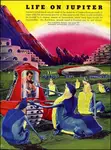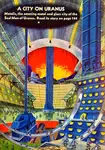A delectable site!
by John Michael Greer
(Cumberland, Maryland, USA)
Zendexor, thank you for hosting this -- I've been lurking here for a month or so, on and off, and decided it was time to say something. On the off chance it's of any importance, I got here via search engine while hunting down some details of Clark Ashton Smith's more SF-ish stories for a fiction project of my own. (Yes, I write -- I have two science fiction novels, a near-future thriller, and the first volume of a Lovecraftian epic fantasy currently in print, with more in process.)
It hadn't occurred to me to think of the pre-space probe solar system as a setting for what I suppose might best be called space fantasy -- this despite growing up in the 1960s and 1970s on a steady diet of science fiction with a lot of OSS in there. Hmm and again hmm. I may want to explore the possibilities. Again, my thanks to you, Harlei, Stid, and the rest of the crew for launching this voyage...
{Comment from Zendexor: Welcome aboard John. You seem like a Jasoomian after my own heart. And the interest in Clark Ashton Smith as a science-fictioneer is extremely welcome. I suppose you have investigated the Smith fragments, collected on the eldritchdark site and in "Strange Shadows". Quite a few opportunities there for expansion into new stories, or at any rate speculation thereon. More comments on this and other topics always appreciated! We hope we shall be hearing more from you.}





































